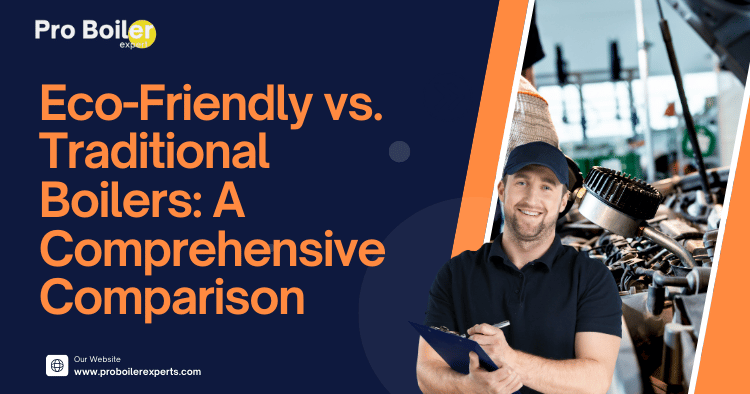Table of Contents
- Introduction
- What Are Traditional Boilers?
- What Are Eco-Friendly Boilers?
- Key Differences Between Eco-Friendly and Traditional Boilers
- Cost Considerations
- Efficiency and Performance
- Environmental Impact
- Maintenance and Longevity
- FAQs
- Conclusion
Introduction
Choosing the right boiler for your home can be a daunting task, especially with the growing emphasis on sustainability and energy efficiency. In this blog post, we will dive into a comprehensive comparison between eco-friendly and traditional boilers, helping you make an informed decision that suits your needs and values.
What Are Traditional Boilers?
Traditional boilers, often referred to as conventional or standard boilers, are the most common heating systems found in homes. They typically use fossil fuels such as natural gas, oil, or coal to generate heat. These boilers operate on a simple principle: they burn fuel to heat water, which is then circulated through radiators or underfloor heating systems to warm your home.
Key Characteristics of Traditional Boilers:
- Fuel Type: Primarily natural gas, oil, or coal.
- Heat Generation: Burns fossil fuels to produce heat.
- Carbon Emissions: Higher emissions due to combustion processes.
For more information on traditional boilers, you can check out resources like the Energy Saving Trust.
What Are Eco-Friendly Boilers?
Eco-friendly boilers, on the other hand, are designed to minimize environmental impact while providing effective heating solutions. These systems can use renewable energy sources, such as solar power, biomass, or heat pumps, which significantly reduce carbon emissions compared to traditional boilers. Eco-friendly options are increasingly popular as homeowners seek sustainable living solutions.
Key Characteristics of Eco-Friendly Boilers:
- Fuel Type: Renewable sources (solar, biomass, electric).
- Heat Generation: Utilizes sustainable resources to produce heat.
- Carbon Emissions: Lower or zero emissions, contributing to a cleaner environment.
For a deeper understanding, visit the Department of Energy.
Key Differences Between Eco-Friendly and Traditional Boilers
| Feature | Traditional Boilers | Eco-Friendly Boilers |
|---|---|---|
| Fuel Source | Fossil fuels (gas, oil, coal) | Renewable sources (solar, biomass, electric) |
| Carbon Emissions | High | Low or negligible |
| Initial Cost | Generally lower | Higher initial investment |
| Efficiency | Variable, often lower | Generally higher due to modern technology |
| Maintenance | Regular maintenance required | May require specialized maintenance |
Cost Considerations
When considering the cost implications of traditional vs. eco-friendly boilers, initial purchase price and long-term savings are essential factors. Traditional boilers tend to have a lower upfront cost, but they may lead to higher utility bills and maintenance costs over time due to reliance on fossil fuels. In contrast, eco-friendly boilers may require a larger initial investment but can save homeowners money in the long run through reduced energy bills and potential government incentives.
Cost Comparison:
- Traditional Boiler: Average cost of installation can range from $3,000 to $7,000.
- Eco-Friendly Boiler: Installation costs generally range from $5,000 to $15,000, depending on the technology.
Efficiency and Performance
Efficiency is a critical factor when comparing boilers. Traditional boilers often have an annual fuel utilization efficiency (AFUE) rating ranging from 70% to 90%. In contrast, eco-friendly boilers can achieve efficiencies of up to 95% or higher, especially heat pumps and condensing boilers. This means that eco-friendly systems use less energy to produce the same amount of heat, leading to lower energy bills and a reduced carbon footprint.
For more information on energy-efficient boiler options, check out the Top 5 Energy Efficient Boiler Types for 2024.
Environmental Impact
The environmental impact of your heating system is perhaps the most significant difference between traditional and eco-friendly boilers. Traditional boilers contribute to air pollution and greenhouse gas emissions due to the combustion of fossil fuels. In contrast, eco-friendly boilers, particularly those using renewable energy, help reduce your carbon footprint and are better for the planet.
Visual Element: Environmental Impact Comparison
Impact Factor Traditional Boilers Eco-Friendly Boilers CO2 Emissions High Low Air Quality Detrimental due to pollutants Minimal impact, often improves air quality Sustainability Non-sustainable fuel sources Utilizes renewable resources
For insights on eco-friendly heating, see the Top 5 Benefits of Eco-Friendly Boilers.
Maintenance and Longevity
Maintenance is crucial for ensuring the longevity and efficiency of your boiler. Traditional boilers typically require annual servicing to prevent breakdowns and maintain efficiency. They also have a lifespan of around 10 to 15 years.
Eco-friendly boilers, while often more reliable, may require specialized maintenance depending on the technology used. For instance, biomass boilers might need regular cleaning, while solar thermal systems require occasional checks of the solar collectors. Generally, eco-friendly boilers can last up to 20 years with proper care.
For maintenance tips, consider checking out the Essential Boiler Maintenance Tips.
FAQs
1. Are eco-friendly boilers worth the investment?
Yes, eco-friendly boilers often lead to long-term savings on energy bills, and their reduced environmental impact is a significant benefit for many homeowners.
2. How can I determine which boiler is best for my home?
Consider factors like your budget, energy efficiency needs, and environmental concerns. Consulting with a heating specialist can also provide valuable insights.
3. Are there government incentives for eco-friendly boiler installation?
Yes, many regions offer incentives, rebates, or tax credits for homeowners who install eco-friendly heating systems. Check with local government programs for more information.
4. What is the average lifespan of a boiler?





